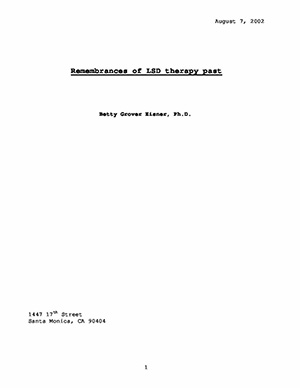Books
Entheogens, Society and Law
2013 • Daniel Waterman
Through the Gateway of the Heart
2013 • Sophia Adamson, Ralph Metzner, Padma Catell
MDMA
The Brotherhood of the Screaming Abyss
2012 • Dennis McKenna
The Psychedelic Renaissance
2012 • Ben Sessa
Psilocybin / LSD / DMT / MDMA / Ibogaine / Ayahuasca / Iboga
Drugs - Without the Hot Air
2012 • David Nutt
LSD
Healing Our Deepest Wounds
2012 • Stanislav Grof
Darwin's Pharmacy
2011 • Richard M. Doyle
The Psychedelic Explorer's Guide
2011 • James Fadiman
LSD
The Ethnopharmacology of Ayahuasca
2011 • Rafael dos Santos
Ayahuasca
Mycelium Running
2011 • Paul Stamets
The Shulgin Index
2011 • Alexander Theodore Shulgin, Tania Manning, Paul F. Daley
Opening the Portals of Heaven
2010 • Beatriz Caiuby Labate, Gustavo Pacheco
Ayahuasca
The Pharmacology of LSD
2010 • Annelie Hintzen, Torsten Passie
LSD
Orange Sunshine
2010 • Nicholas Schou
LSD
The Doors of Perception and Heaven and Hell
2009 • Aldous Huxley
LSD / Mescaline
LSD - The Highway to Mental Health
2009 • Milan Hausner with Erna Segal
LSD
The Psychedelic Journey of Marlene Dobkin de Rios
2009 • Marlene Dobkin de Rios
Ayahuasca
A Hallucinogenic Tea, Laced with Controversy: Ayahuasca in the Amazon and the United States
2008 • Marlene Dobkin de Rios, Roger Rumrrill
Ayahuasca
LSD Psychotherapy
2008 • Stanislav Grof
LSD
Psilocybin: Magic Mushroom Grower's Guide
2006 • O.T. Oss & O.N. Oeric, Terence McKenna
Psilocybin
The Antipodes of the Mind
2003 • Benny Shanon
Ayahuasca
Remembrances of LSD Therapy Past
2002 • Betty Eisner
LSD
Ecstasy: The Complete Guide
2001 • Julie Holland
MDMA
DMT: The Spirit Molecule
2000 • Rick Strassman, M.D.
DMT
Storming Heaven
1998 • Jay Stevens
LSD
True Hallucinations
1994 • Terence Mckenna
The Invisible Landscape
1994 • Terence Mckenna
Acid Dreams
1994 • Martin A. Lee, Bruce Shlain
LSD
Food of the Gods
1993 • Terence K. McKenna
Psilocybin
The Archaic Revival
1992 • Terence Mckenna
Gateway to Inner Space
1990 • Christian Ratsch
The Road to Eleusis
1978 • R. Gordon Wasson, Albert Hofmann, Carl A. P. Ruck
Hallucinogens and Shamanism
1973 • Michael Harner
Psilocybin / Ayahuasca
The Beyond Within
1972 • Sidney Cohen
LSD











